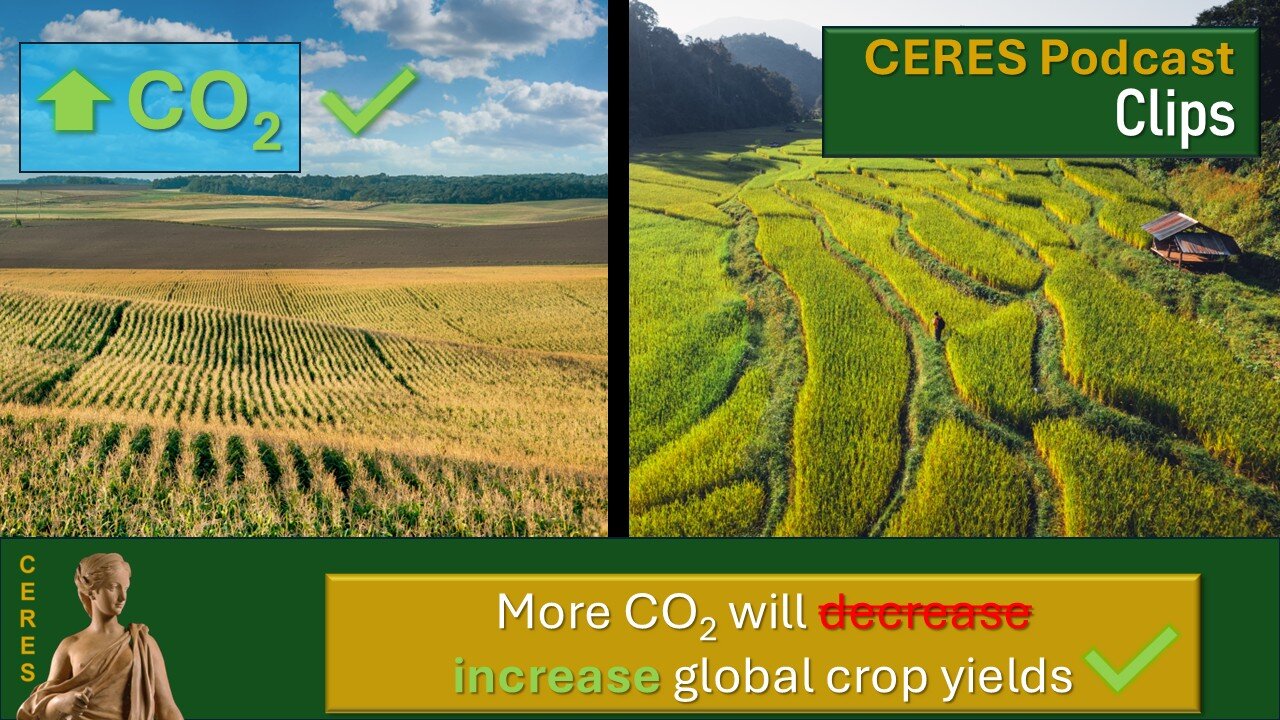Premium Only Content

New study finds more carbon dioxide (CO2) will increase, NOT decrease crop yields!
In this clip from Episode 1 of the CERES Podcast, the CERES team leaders (Dr. Willie Soon, Dr. Ronan Connolly & Dr. Michael Connolly) look at the recent McKitrick (2025) paper investigating the Social Cost of Carbon (SCC). The SCC is an estimate of what the net economic cost of carbon dioxide (CO2) emissions is to society.
For decades, the US Environmental Protection Agency (EPA) has been arguing that CO2 emissions cause major economic harm through climate change, and that therefore CO2 should be treated as an atmospheric pollutant – even though CO2 is a naturally-occurring gas that is the main source of carbon for all carbon-based life on this planet (i.e., all known life including plants, trees animals, and humans). They have been doing this on the basis of their estimate of the SCC value.
In 2023, under the Biden administration, the EPA dramatically increased its previous estimate from 2013 of the SCC by 5 times. Nearly half of that increase was based on projected agricultural damages. The EPA predicts that increasing the amount of CO2 in the atmosphere will lead to major losses in crop yields due to human-caused global warming. They based this prediction on the Moore et al. (2017) study. Moore et al. (2017) had used the Challinor et al. (2014) database of 1722 studies looking at the predicted crop yields in the future.
However, Prof. Ross McKitrick found that Moore et al. (2017) had only been able to use half of the studies in the database. McKitrick was able to reanalyse the database and increase the number of studies that could be used by nearly 50%.
When he repeated the Moore analysis with this new expanded and improved database, he found that the conclusions changed completely. Instead of global warming reducing crop yields, it turns out that global warming should increase crop yields!
Therefore, this new McKitrick (2025) paper shows that the “Social Cost of Carbon” needs to be majorly reduced from the US EPA’s current estimates.
🔹 🔹 🔹 🔹
Chapters:
00:00 The “Social Cost of Carbon” has been majorly reduced by McKitrick (2025) study
01:37 What McKitrick (2025) did and why
05:12: Correcting for CO2 fertilization’s positive effects on crop yields
06:17 The key results of the study
Link to the full podcast episode: https://rumble.com/v6q2d84-wildfires-to-weather-balloons-debunking-the-97-of-scientists-agree-myth-cer.html?e9s=src_v1_ucp
🔹 🔹 🔹 🔹
⭐ If you want to support the work of CERES, please visit us at https://www.ceres-science.com/support-us
🔹For more about Dr. Ronan Connolly & links to his social media channels, visit https://ronanconnollyscience.com/
🔹 🔹 🔹 🔹
⭐ Relevant literature
❶ McKitrick, R. Extended crop yield meta-analysis data do not support upward SCC revision. Sci Rep 15, 5575 (2025). https://doi.org/10.1038/s41598-025-90254-2
❷ Challinor, A., Watson, J., Lobell, D. et al. A meta-analysis of crop yield under climate change and adaptation. Nature Clim Change 4, 287–291 (2014). https://doi.org/10.1038/nclimate2153
❸ Moore, F.C., Baldos, U., Hertel, T. et al. New science of climate change impacts on agriculture implies higher social cost of carbon. Nat Commun 8, 1607 (2017). https://doi.org/10.1038/s41467-017-01792-x
-
 11:16
11:16
CERES-Science
5 months agoGlobal greening: How “CO2 pollution” is actually making Earth greener
121 -
 44:08
44:08
The Why Files
6 days agoThe CIA, Men in Black and the Plot to Take Out JFK | The Maury Island Incident
24.4K56 -
 2:07:23
2:07:23
TimcastIRL
5 hours agoTrump SLAMS China With NEW 100% Tariff, Stocks & Crypto TUMBLE | Timcast IRL
246K115 -
 5:15:25
5:15:25
SpartakusLIVE
6 hours agoBF6 LAUNCH DAY || WZ and BF6 followed by PUBG - The PERFECT Combo?
41K1 -
 1:33:59
1:33:59
Glenn Greenwald
8 hours agoQ&A with Glenn: Is the Gaza Peace Deal Real? Why was the Nobel Peace Prize Given to Venezuela's Opposition Leader? And More... | SYSTEM UPDATE #529
98.9K62 -
 1:24:01
1:24:01
Flyover Conservatives
1 day agoURGENT FINANCIAL UPDATE! October 14–31: The Great and Terrible Day Has Arrived - Bo Polny; 5 Mindsets You Must Master - Clay Clark | FOC Show
31.9K4 -

VapinGamers
4 hours ago $0.67 earnedBattlefield 6 - All Protatoe and Nothing but Net - !rumbot !music
18.5K -
 3:23:28
3:23:28
GritsGG
4 hours agoRANK GRIND! Most Wins in WORLD! 3734+!
12K -
 LIVE
LIVE
I_Came_With_Fire_Podcast
13 hours agoChina Owning the Mississippi? | Letitia James Indicted, But Don't Get Excited | Insurrection Inbound
347 watching -
 LIVE
LIVE
Eternal_Spartan
12 hours ago🟢 Eternal Spartan Plays Battlefield 6! | USMC Vet
101 watching